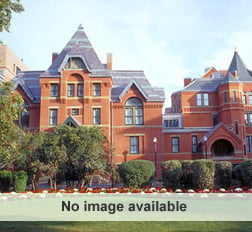School Stats
- Resident Tuition $41,007
- Non - Resident Tuition $64,173
- Application Fee $60
- AVG DAT 20.0
- AVG GPA 3.7
Crime: Detailed Stats >
Admissions Information
- Dental Student Admissions Office
- 311 Dental Science Building N
- Iowa City, IA 52242
- United States
- Phone: (319) 335-7157
- Fax: (319) 335-7155
- Email: [email protected]
- Website: www.dentistry.uiowa.edu/
School Overview
University of Iowa School of Dentistry & Dental Clinics Fast Facts
School Info
For well over 100 years, the College of Dentistry has been an integral part of The University of Iowa and a resource to the state of Iowa. The great majority of Iowa dentists are alumni of the College of Dentistry. The strength of our relationships with the university, the state, the profession, and with academic colleagues, alumni, practitioners, and industry, has enabled us to become one of the top dental schools in the United States. Our connections involving graduate education and research extend well beyond national boundaries, and give the College of Dentistry a reputation that is recognized worldwide. With the arrival of the 21st century, our curriculum reflects new knowledge, technical excellence, ethics and practice management, with an increased emphasis on critical thinking and problem-based learning. The Dental Science Building has undergone the first major renovation in more than twenty-five years, with remodeled clinic areas, research laboratories, and a $3.7 million Simulation Clinic that prepares students for their patient experiences. Over 25 new faculty have been appointed to complement an experienced senior faculty. All new faculty have advanced training.
Curriculum
Students enrolled in the dental curriculum attend classes for ten to eleven months, including a six-week summer session. Course work during the first and second years of study integrates the basic sciences with preclinical and clinical disciplines. The basic sciences include gross anatomy, general histology, oral histology and embryology, microbiology, pathology, pharmacology, physiology, and biochemistry. Students also study topics specific to dentistry, such as principles of occlusion, anesthesia and pain control, operative dentistry, facial growth and development, cariology, and preventive dentistry. During the latter part of the first year, students are introduced to their first clinical patient-treatment situation. The second-year program continues the study of basic sciences and preclinical courses, with additional patient-treatment experiences in the dental clinics. First- and second-year students make extensive use of the College of Dentistry`s advanced teaching facilities. In their classes, they learn procedures on simulator units that help smooth the transition from classroom to clinic. Each of the 80 units in the college`s Simulation Clinic features a mannequin positioned like a reclining patient and a monitor where demonstrations and other images are broadcast. After class, students master techniques in a bench laboratory or peruse electronic learning resources in self-guided study.
Facilities
The College enjoys a close relationship with the other units that comprise The University of Iowa Health Sciences campus, including the Colleges of Medicine, Nursing, Public Health, and Pharmacy; The University of Iowa Hospitals and Clinics; the Bowen Science Building and the Hardin Library for the Health Sciences. Through this association, the College of Dentistry has developed interdisciplinary programs in diagnostic testing, research, and patient care and has earned international recognition for teaching, research, and service. The College of Dentistry is located in an attractive modern building that offers well-organized space and the latest equipment for teaching and research. One complete wing of the College is devoted to clinical teaching, with various departmental clinic facilities, laboratories, clinical research space, and a cafeteria. The second wing houses teaching laboratories, a simulation clinic, the College`s administration offices, educational media service, the Department of Preventive and Community Dentistry, and the Dows Institute for Dental Research, which occupies the entire fourth floor.


What are your suggestions for the admissions office?